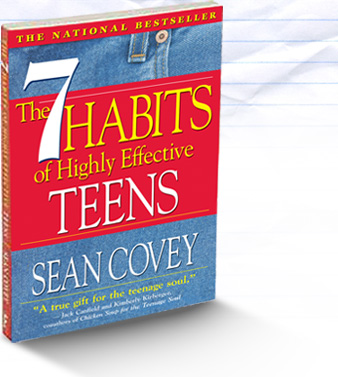As those who have been reading the Bliss Blog for awhile may know, I wear many hats. Tonight I donned the one that is labeled recovery counselor in a drug and alcohol outpatient program. On Monday nights I offer a group for folks who have co-occurring conditions which translates to mental health diagnoses and substance abuse issues; not an easy combo for them and not always simple to facilitate. There are times when I feel like I am pulling teeth to encourage speaking about what is on their minds. Fortunately tonight wasn’t one of them. I brought into the room a book called The 7 Habits of Highly Effective Teens written by Sean Covey who is the son of Stephen Covey who wrote The 7 Habits of Highly Effective People which I read for the first time in the early 1990’s. What jumped out at me was that although using a substance to get through life, to self medicate, to relieve boredom, to socialize are clearly habitual, even more so are the daily activities of every person on the planet, even if they never indulge in their drug of choice.
My definition of a habit, is something I do routinely, sometimes as a ritual, sometimes unconsciously.
Some of mine include:
Setting intention each morning before getting out of be to “have extraordinary experiences and connect with amazing people.”
Writing throughout the day.
Social media interaction.
Tending to hygiene.
Lately, starting my day with a fruit and veggie smoothie.
Going to the gym 4-6 times a week.
Doing laundry.
Cleaning the house.
Going to my various jobs.
Putting my seatbelt on before I drive.
Using cloth bags when I go to the store.
All of these sound like responsible and healthy adult things to do. Let me add that others are not indicative of a wellness program.
These are:
Biting my nails at times.
Over-indulging in my drug of choice-chocolate.
Self deprecating thoughts.
Going to be too late.
Making my son wrong in my mind if he doesn’t do things my (a.k.a. the right) way.
Taking on too much at once.
Saying yes when I really want to say no.
Both Coveys recommend these core actions:
The First Three Habits surround moving from dependence to independence (i.e., self-mastery):
- Habit 1: Be Proactive
Take initiative in life by realizing that your decisions (and how they align with life’s principles) are the primary determining factor for effectiveness in your life. Take responsibility for your choices and the consequences that follow.
- Habit 2: Begin with the End in Mind
Self-discover and clarify your deeply important character values and life goals. Envision the ideal characteristics for each of your various roles and relationships in life. Create a mission statement.
- Habit 3: Put First Things First
Prioritize, plan, and execute your week’s tasks based on importance rather than urgency. Evaluate whether your efforts exemplify your desired character values, propel you toward goals, and enrich the roles and relationships that were elaborated in Habit 2.
Interdependence
The next four have to do with Interdependence (i.e., working with others):
- Habit 4: Think Win-Win
Genuinely strive for mutually beneficial solutions or agreements in your relationships. Value and respect people by understanding a “win” for all is ultimately a better long-term resolution than if only one person in the situation had gotten his way.
- Habit 5: Seek First to Understand, Then to be Understood
Use empathic listening to be genuinely influenced by a person, which compels them to reciprocate the listening and take an open mind to being influenced by you. This creates an atmosphere of caring, and positive problem solving.
- Habit 6: Synergize
Combine the strengths of people through positive teamwork, so as to achieve goals no one person could have done alone.
- Habit 7: Sharpen the Saw
Balance and renew your resources, energy, and health to create a sustainable, long-term, effective lifestyle. It primarily emphasizes exercise for physical renewal, prayer (meditation, yoga, etc.) and good reading for mental renewal. It also mentions service to society for spiritual renewal.
As we explored these ideas, the energy lifted and they were willing to be more courageous with taking a look at what may have held them back and kept them stuck. As I spoke with them, I was of course, also addressing myself and my less than sterling habits as I mentioned above. Because we teach what we need to learn and I’ve heard it said, that when we teach, we learn twice, it was no accident that I chose this as tonight’s topic. Needing to clean up the habits that no longer serve, sweeping them up into the dustpan.
“Watch your thoughts; they become words. Watch your words; they become actions. Watch your actions; they become habit. Watch your habits; they become character. Watch your character; it becomes your destiny.”-Lao Tzu


